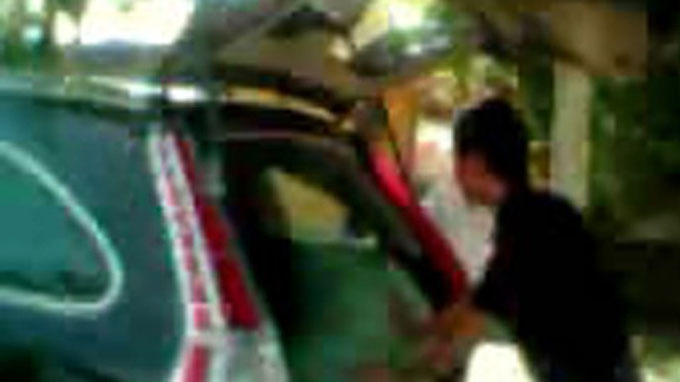Head of the management board of Hoang Muoi temple in central Nghe An province’s Hung Nguyen district regularly has another company count the money from visitors’ contributions to the temple and shadily administers the temple’s money boxes, with the seven other members and local officials either turning a blind eye or acting as accomplices.
Truong Van Thai, head of the management board of Hoang Muoi temple regularly has security guards load around seven to ten sacks of money of small denominations onto a car. The money was supposed to be spent on the temple’s overhead expenditures and maintenance.
Thai said that since he became head of the temple’s management board in 2005, he has hired Trung Long Co. based in Vinh city, which badly needs small-denominated money, to count the money, once every two or three months.
Nguyen Dinh Tuong, who has joined the management board since March, recently witnessed Thai dispatching seven sacks of money to Trung Long Co. to be counted. With no minutes being made or no other manager sent to accompany the car, Tuong grew suspicious of Thai’s shady conduct, and notified the district officials. Thai then summoned the car back.
Pham Quoc Viet, deputy head of the district’s People’s Committee, acknowledged Thai’s wrongdoings and said he sent a team to the Hoang Muoi temple to inspect and seal the seven sacks of money on May 28.
It took three days to finish counting the money, which totaled over VND300 million (US$14,423), with small denominations of VND500 to 2,000.
Le Van Hung, head of the Hung Thinh commune’s People’s Committee also admitted his knowledge of Thai’s act, but explained that the money is a small amount contributed by visitors since 2000 to buy kerosene for the temple’s lamps.
According to Hung, the temple’s main money boxes kept within the temple all have two keys, with one kept by Thai and the other by one of the commune’s financial officers.
Hung also maintained that his officers are always present whenever Thai unlocks the money boxes.
However, Tuong, who had notified the local government of Thai’s wrongdoings, said the opposite.
“Thai and Nguyen Ba De, the temple’s accountant, not the commune’s financial officer, have the keys. When the boxes are full, Thai and De just unlock them, without the presence of any representatives from the local government. Sometimes Thai even unlocked them on his own,” Tuong said.
Thai said that the temple’s management board hands all the money to the commune’s People’s Committee every year as regulated. They handed VND1.3 bil (US$62,500) in the first six months of this year alone.
Thai claimed that the money in the sacks isn’t included in the visitors’ money contributions to be handed in, but is the small amount of change visitors put on the altars and is thus used for trivial fees and payment for members of the management board, as the assigned 5% of the total money contributions isn’t enough.
“At first, I hired some people to count the money right at the temple, but things didn’t work out. Later, the members of the management board counted it themselves, but several complained of backache and allergy to the old cash,” Thai explained about hiring the Trung Long Co. to count the money.
Thai claimed that after his dubious action was detected on May 27, he submitted over VND1 billion to the local government, but Viet, deputy head of the district’s People’s Committee, said that Thai handed in over VND4 billion.
The local government convened a meeting on June 12 to reprimand the eight members of the Hoang Muoi temple’s management board, except Tuong, the whistle-blower.
They, including Thai and De, all admitted to their negligence and poor management over the money boxes.
De, the temple’s accountant, said in April, Thai unlocked the boxes on his own and collected VND850 mil, of which he handed in only VND310 mil to the commune, and gave the remaining VND540 mil to Mao, another member of the management board to keep.
Thai insisted that he be reprimanded as a penalty.
The local officials said they will look more closely into the case.
|
The Hoang Muoi temple, built in 1634, is known in the region for its sacredness. The dominant god worshipped at the temple is Sir Hoang Muoi, who is believed to be a talented military leader in feudal times. The temple was named a cultural heritage in 2002. It welcomes thousands of visitors from all over the country and elsewhere every year. |




















































